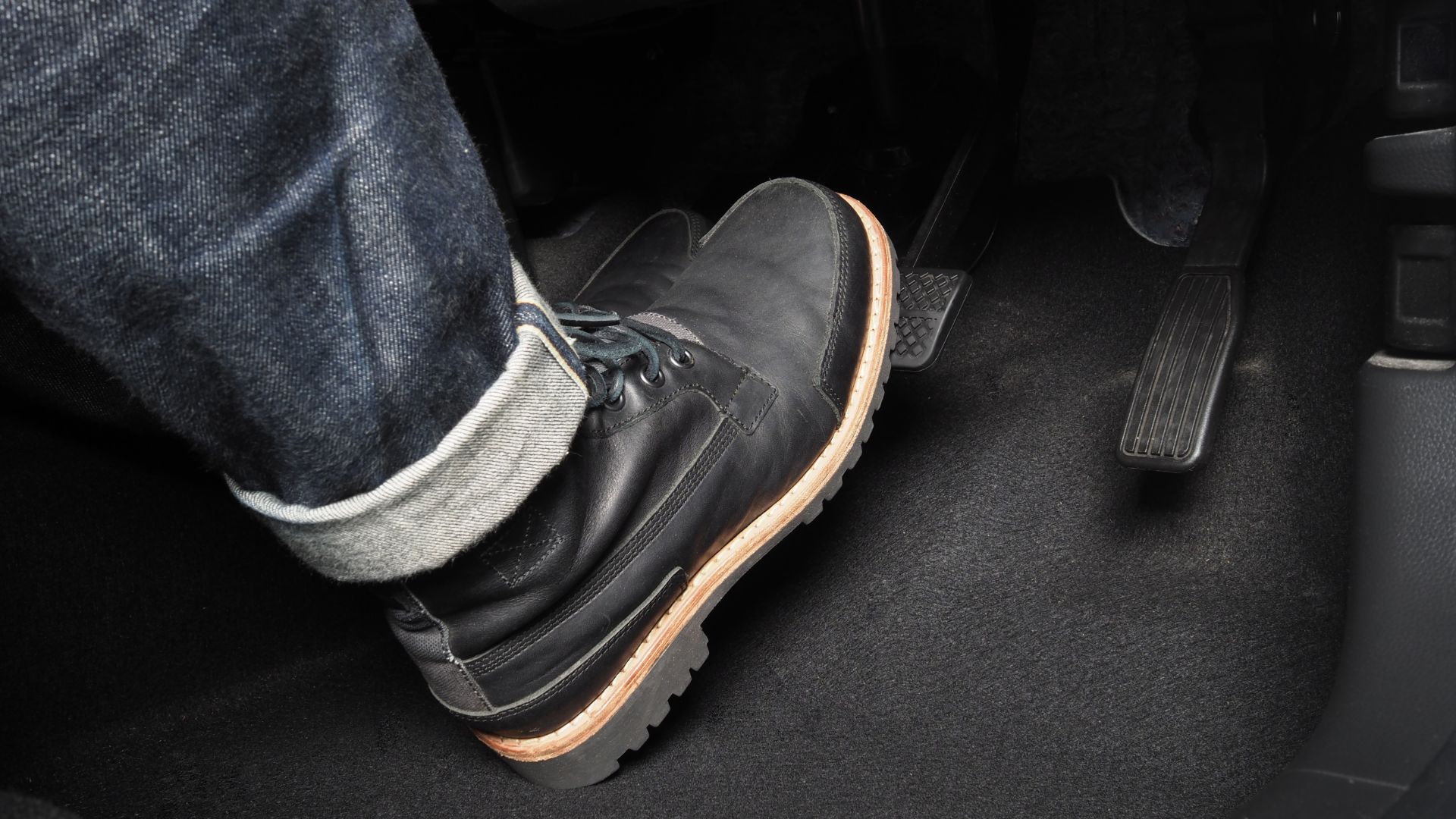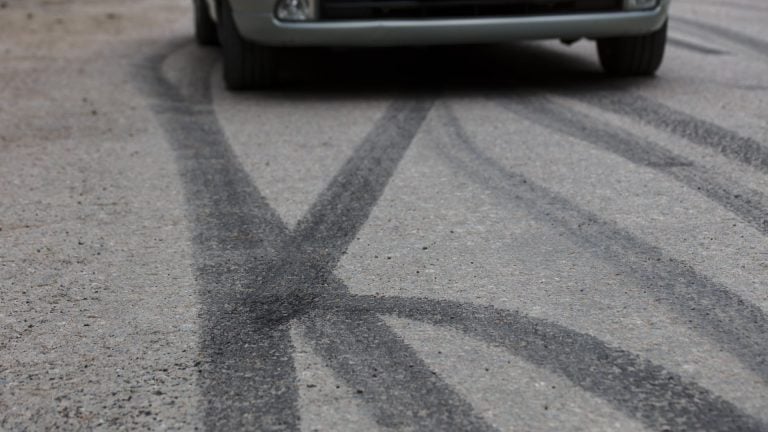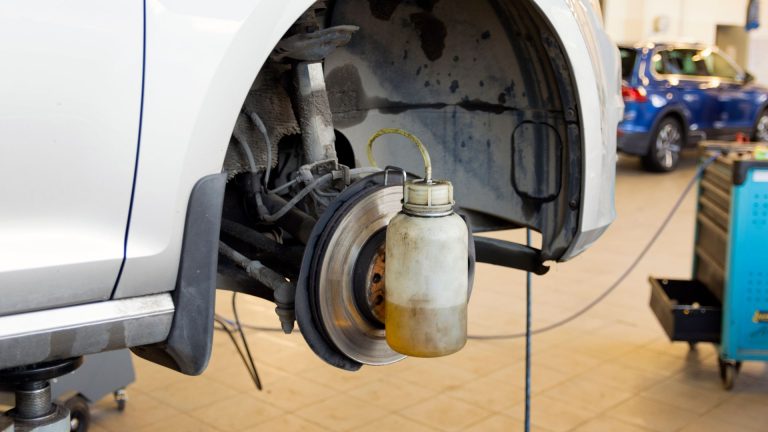Brake pedal goes to the floor — causes and fixes
Address a brake pedal that goes to the floor.

The braking system of your car is the most important one for driving safety, and, naturally, sometimes you’ll hear braking sounds. However, if the brake pedal goes to the floor, you might be stunned and don’t know how to react.
A sinking brake could be a serious problem since you won’t have that feeling of pressure under the pedal which is crucial for proper braking performance. To make things worse, several reasons might cause a sinking brake. That’s why our team decided to give you an overview of the reasons that most likely caused a sinking brake pedal, and explain why it happens.
The basics behind your car’s braking system

To understand the reasons behind spongy or sinking brakes, you must understand how a braking system works in your car. When you step on the brake pedal, that pressure gets transferred into a mechanical force that moves the brake pushrod.
The pressure gets amplified by the brake booster, and it affects the master cylinder. The cylinder is filled with brake fluid, and when the mechanical pressure reaches it, it gets converted into hydraulic pressure. At this point, the cylinder releases brake fluid through the brake lines and it travels to your wheels.
The hydraulic pressure moves the caliper’s piston and forces the brake pad against the brake disc. It generates friction and the pressure of the pads on a brake disc causes the wheel to stop spinning. So, if you can’t press your brake pedal properly and it sinks to the floor, you won’t be able to brake properly, right?
Well, there are a lot of variables to consider here, but you’ll still be able to use your brakes to at least get home safely. It’s, either way, a difficult task to adjust to a sinking brake, and you shouldn’t keep driving your car like that.
What happens when your brake sinks?
We get it, it’s a traumatizing experience if your brake pedal goes to the floor, but the most important thing is to stay calm. Your brakes could sink for numerous reasons, and the most common one is low brake fluid level.
The braking system uses hydraulic pressure, and as soon as you press the pedal, the fluid gets released and flows through the system and into the caliper. Under caliper pressure, brake pads press against the rotors to stop your wheel from moving.
However, if the pressure is low due to low brake fluid, pressing the brake will feel light and spongy. The key thing is – don’t panic and try to find a safe place to stop if possible. Regardless of the issue, you can deal with it later. The important thing to do at the spot is to try to pump the brake pedal.
It sometimes works if the loss of pressure was caused by the air bubble in the brake lines. Pumping the brake will help transfer the fluid through the braking system. When you do it, make sure to firmly press the pedal all the way, lift your foot, and repeat.
Find a safe way to stop
While pumping the brake pedal might help in case of an air bubble stuck in the brake lines, it’s not possible to do it while driving. So, the first thing on your mind should be coming to a safe stop. If you can’t use your brakes, you can use engine braking to slow your vehicle down.
Engine braking is better suited for manual cars, and it includes downshifting to a lower gear gradually. With each downshift, your car’s speed will get lower, until you reach second gear. At this point, it’s dangerous to try to shift into first gear with your wheels still moving, unless you are an expert driver and know how to adjust the engine revolutions with the driving speed.
Instead, you can take the shifter out of the gear and use an emergency brake to stop your car. Remember to use the blinkers during slowing down, to let other drivers know that you have a bit of trouble. In emergency cases, you can shift down the gears with an automatic car.
It’s not the best thing for the transmission, so make sure to gradually reduce the speed and only do this if your brakes sink while driving.
Main reasons why your brake pedal sinks to the floor

Now that you know a bit more about why the brake pedal pressure is important for the braking system to work, it’s time to get down to business. A change in pressure of the brake pedal isn’t likely to be influenced by worn-out brake pads, so these are the main reasons you’ll want to consider:
- Brake fluid leaks
- Problems with the master cylinder
- Improper brake bleeding
- Bad brake booster
The first thing to check is brake fluid, and you must look for both internal and external brake fluid leaks. As mentioned, mechanical pressure that generates when you press the brake pedal transfers into hydraulic pressure via brake fluid. So, if the fluid level is low, a lack of pressure might cause your pedal to sink to the floor.
Brake fluid leaks
You can check for external brake fluid leaks yourself by getting under your car and inspecting each wheel separately. Take a look at your brake caliper and the rubber line to make sure there are no leaks. You should also check the brake fluid level by taking a look at the brake master cylinder.
On a new vehicle, there’s no need to remove the cap, while older vehicles might require you to remove the cap to get an accurate reading. Either way, if the brake fluid level is low, you can top it up and see if the brake pedal restores pressure.
However, if the low fluid level isn’t caused by worn brakes, but by a fluid leak instead, that’s only a temporary solution. Brake leaks commonly occur on fluid lines, so make sure to have your mechanic thoroughly inspect them to find the source of the leak.
Problems with the brake master cylinder
Several things could happen to your brake master cylinder and cause a brake pedal pressure problem. First, the seal could degrade over time, causing brake fluid leaks which results in low hydraulic pressure.
Also, the cylinder itself might degrade, since it’s a valve that releases the brake fluid from the reservoir and pushes it through the brake lines. It’s also possible that someone didn’t seal the cylinder cap properly, resulting in the air coming through and ruining the cylinder.
Sometimes, you can repair the master cylinder or even buy a rebuilt one, but the best option is to go with a new one. That’s the only way you can make sure that the pressure change doesn’t happen again.
Air in the brake lines
If air gets into your brake lines, it prevents the pressure buildup, resulting in poor braking performance and a brake pedal that goes to the floor. The air might enter your brake lines when topping up the fluid, or doing brake repairs.
At this point, the solution would be to bleed the brakes, but you should have a professional do it properly. Air could also enter the brake lines in case of improperly bled brakes. Bleeding the brakes refers to removing the air from the brake lines and changing the brake fluid in the system properly.
If your brakes are properly bled, there will be no more air in your brake lines and fluid will generate proper braking pressure once again. Since braking system repairs are quite common, it might be a good idea to bleed your brakes every two or three years, just in case.
Failing brake booster
As mentioned, the brake booster is used to amplify the mechanical pressure that later gets converted into hydraulic pressure. Like your master cylinder, the brake booster could fail or degrade due to high mileage and the age of the part.
Your mechanic might try to disconnect the vacuum supply to the brake booster and attach it again to see if that sorts out the problem. In the worst-case scenario, you’ll have to replace it with a new booster for the brake pedal pressure to generate properly again.
Fixing a sinking brake pedal
Sadly, there’s not much you can do on the spot if your brake pedal sinks to the floor. The first thing that comes to mind is inspecting the brake fluid level and topping it up if you have the fluid in your car. Still, if there’s a leak in the system, that won’t sort out your problems completely.
You might have to bleed the brakes or replace the master cylinder if the air in the system is what caused the problem in the first place. On the other hand, you should check the calipers and brake lines as that’s where the leaks usually occur. If possible, try to find a reasonable master cylinder replacement and buy a new one instead of going for poor-quality replacements or rebuilt cylinders.
Bleed your brakes
Brake bleeding is a procedure that’s conducted by mechanics to remove air from the brake lines. You can also do this yourself, but if you don’t have any experience, it’s better to leave it to a professional. There’s a bleeder screw on each brake caliper and it’s used to drain all the brake fluid from the lines.
It includes removing all the existing brake fluid along with the air that entered the brake lines and replacing it with new fluid. If done right, it can restore the pressure within your brakes and get the brake pedal in the optimal state once again.
Fix brake fluid leaks
If there’s a low brake fluid level in your braking system, you might be dealing with a leak that caused the sinking brake pedal. To test this, get below your car and check each caliper for fluid leaks. Also, make sure to check the master cylinder to see if there’s an internal leak.
If you can’t find it yourself, your mechanic might be able to find the source of the leak by inspecting the fluid line fittings. Replacing the bad fitting and restoring the brake fluid level should get your brake pedal up again in this case.
Replace the master cylinder or a brake booster
Finally, the cause of your sinking brake might be a failed brake booster or a bad master cylinder. The master cylinder could easily get ruined by excess air coming into it in case of brake fluid replacement. Also, the internal seals may have worn off, in which case you’ll have to replace the cylinder to get the pressure back up.
Finally, your brake booster is an important component and it amplifies the pressure in the system once you press the brake pedal. If a bad booster was the problem, replacing it should solve your issues. Note that replacing the master cylinder or a brake booster isn’t the cheapest solution for the problem.
Our take
In the end, it all comes down to knowing the main reasons why your brake pedal might lose pressure if the situation occurs to you. Hopefully, you’ll be able to use the information in this guide to quickly solve the problem and avoid having to stick with a sinking brake pedal for a long time.
It’s not only inconvenient, but it’s also dangerous as your braking performance might be reduced if the brake pedal goes to the floor.
What should you do if your brake pedal goes to the floor?
If your brake pedal goes to the floor, you should check the calipers and brake lines for fluid leaks, as well as inspect the master cylinder. If air has breached the master cylinder seal, you might have to bleed the brakes to remove the air from the brake lines.
What would be the cause of a dropping brake pedal with no fluid loss from the system?
If there’s no reduction in brake fluid level and your brake pedal sinks to the floor, it might be due to air in the brake fluid lines or a faulty master cylinder.
Why is there no pressure on my brake pedal?
There might be no pressure on your brake pedal if there’s a brake fluid leak, the air in the brake lines, or a faulty master cylinder and brake booster.
Have a full brake pedal when the engine is off but goes to the floor when running?
It’s normal for the brake pedal to go toward a floor when you start your engine. However, if it stays down and the pressure is low, it indicates a hydraulic pressure problem or a brake booster malfunction.